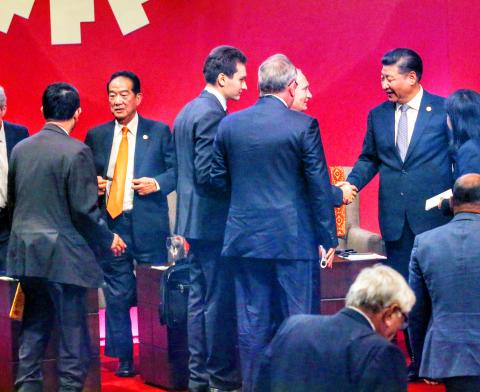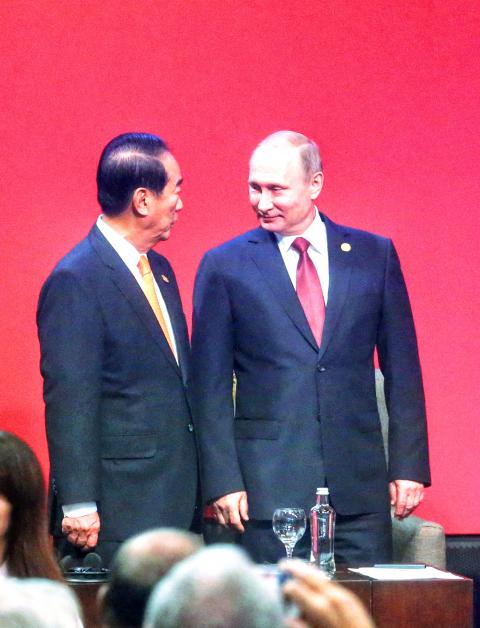People First Party (PFP) Chairman James Soong (宋楚瑜), Taiwan’s envoy to the APEC summit, talked with Chinese President Xi Jinping (習近平) for 10 minutes about cross-strait trade and economic issues in Lima, Peru, on Saturday, a member of Taiwan’s delegation said.
PFP Legislator Lee Hung-chun (李鴻鈞) said that Soong took advantage of a delay of the APEC Business Advisory Council meeting to engage in talks with several leaders, including Xi, Russian President Vladimir Putin, Japanese Prime Minister Shinzo Abe and Philippine President Rodrigo Duterte.
Lee said Soong’s conversation with Xi occurred naturally following their encounter at the venue, adding that they shook hands and sat to discuss policy issues, with Soong expressing the hope that China will resume cross-strait economic exchanges, especially those that benefit Taiwan’s small and medium-sized enterprises.

Photo courtesy of the Chinese Taipei APEC delegation
Soong and Xi agreed on the topics and they are to separately issue news releases detailing the contents of their conversation, Lee said.
Because of the two men’s “good personal relationship,” Xi noticed that Soong was wearing the same orange tie he wore at their meeting in Beijing in 2014, Lee said.
Soong and Xi did not mention the so-called “1992 consensus” or the “one China” principle, because President Tsai Ing-wen (蔡英文) did not authorize Soong to broach those subjects, Lee said.

Photo courtesy of the Chinese Taipei APEC delegation
The “1992 consensus” — a term former Mainland Affairs Council chairman Su Chi (蘇起) admitted to making up in 2000 — refers to a tacit understanding between the Chinese Nationalist Party (KMT) and the Chinese Communist Party that both sides of the Taiwan Strait acknowledge there is “one China,” with each side having its own interpretation of what “China” means.
In response to questions from the media about the absence of any photographs proving the exchange between Soong and Xi, Lee said photographs are “insignificant” in light of the facts that a conversation between the two did take place.
As Soong is acting as Tsai’s envoy at the summit, any statement he made during the meeting would be reported to the Presidential Office, Lee said, adding that the PFP leader would give the president a full briefing upon his return to Taipei and that a news conference would be held to inform the public of what transpired during the summit.
Soong’s talks with Putin took up a “substantial” amount of time, while he also conferred with the representatives of South Korea, Vietnam, Thailand, Australia, Chile, Indonesia and Papua New Guinea, Lee said.
Lee said Soong invited Putin — who had expressed an interest in Taiwan — to visit the nation, and he had a “cordial” conversation with Duterte.
Lee added that the nature of Soong’s conversation with Abe was a “simple exchange of greetings.”
When asked whether a more formal meeting with Abe has been arranged, Lee said: “We still have tomorrow for that, at any rate,” without clarifying what that meant.
Peruvian President Pedro Pablo Kuczynski welcomed the leaders to the council meeting, where Soong was seated between Putin and US Trade Representative Michael Froman, and separated from Xi by five seats.
Soong was seen engaging in brief talks with Putin and Froman, but did not interact with Xi during the meeting.
Presidential Office spokesman Alex Huang (黃重諺) said in Taipei that the government welcomed the exchanges between Soong and Xi, adding that it was “natural” for interactions to occur between the president’s envoy and China’s head of state.
Huang said that Soong has maintained close contact with the office to brief it on the events at the summit and that he also promptly notified the office of the content of his talks with Xi.
“It has always been our hope that Soong could have interactions with the representatives of various nations at the meeting,” Huang added.
Additional reporting by CNA

NATIONAL SECURITY THREAT: An official said that Guan Guan’s comments had gone beyond the threshold of free speech, as she advocated for the destruction of the ROC China-born media influencer Guan Guan’s (關關) residency permit has been revoked for repeatedly posting pro-China content that threatens national security, the National Immigration Agency said yesterday. Guan Guan has said many controversial things in her videos posted to Douyin (抖音), including “the red flag will soon be painted all over Taiwan” and “Taiwan is an inseparable part of China,” while expressing hope for expedited “reunification.” The agency received multiple reports alleging that Guan Guan had advocated for armed reunification last year. After investigating, the agency last month issued a notice requiring her to appear and account for her actions. Guan Guan appeared as required,

A strong cold air mass is expected to arrive tonight, bringing a change in weather and a drop in temperature, the Central Weather Administration (CWA) said. The coldest time would be early on Thursday morning, with temperatures in some areas dipping as low as 8°C, it said. Daytime highs yesterday were 22°C to 24°C in northern and eastern Taiwan, and about 25°C to 28°C in the central and southern regions, it said. However, nighttime lows would dip to about 15°C to 16°C in central and northern Taiwan as well as the northeast, and 17°C to 19°C elsewhere, it said. Tropical Storm Nokaen, currently

PAPERS, PLEASE: The gang exploited the high value of the passports, selling them at inflated prices to Chinese buyers, who would treat them as ‘invisibility cloaks’ The Yilan District Court has handed four members of a syndicate prison terms ranging from one year and two months to two years and two months for their involvement in a scheme to purchase Taiwanese passports and resell them abroad at a massive markup. A Chinese human smuggling syndicate purchased Taiwanese passports through local criminal networks, exploiting the passports’ visa-free travel privileges to turn a profit of more than 20 times the original price, the court said. Such criminal organizations enable people to impersonate Taiwanese when entering and exiting Taiwan and other countries, undermining social order and the credibility of the nation’s

‘SALAMI-SLICING’: Beijing’s ‘gray zone’ tactics around the Pratas Islands have been slowly intensifying, with the PLA testing Taiwan’s responses and limits, an expert said The Ministry of National Defense yesterday condemned an intrusion by a Chinese drone into the airspace of the Pratas Islands (Dongsha Islands, 東沙群島) as a serious disruption of regional peace. The ministry said it detected the Chinese surveillance and reconnaissance drone entering the southwestern parts of Taiwan’s air defense identification zone early yesterday, and it approached the Pratas Islands at 5:41am. The ministry said it immediately notified the garrison stationed in the area to enhance aerial surveillance and alert levels, and the drone was detected in the islands’ territorial airspace at 5:44am, maintaining an altitude outside the effective range of air-defense weaponry. Following